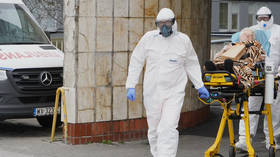DNA test to be added to Covid screening

The Polish Health Ministry is planning to introduce a new type of screening for coronavirus after a gene was discovered that determines the likelihood of a patient suffering from severe or fatal Covid-19.
People most at risk of suffering the severest effects or even dying of coronavirus can be identified using a genetic test, health officials in Poland revealed this week. The study that resulted in the discovery was supported by the country’s Ministry of Health and Medical Research Agency, and involved around 1,500 patients with Covid-19. Researchers from the Medical University of Bialystok identified a gene in chromosome 3 that significantly influences how badly the virus will affect an individual.
“After more than a year and a half of work, it was possible to identify a gene responsible for a predisposition to becoming seriously ill [with Covid],” Health Minister Adam Niedzielski said at a press conference on Thursday.
The findings will now be applied to help identify patients at increased risk from the virus when or even before they contract the infection. The Health Ministry plans to develop and launch a “relatively simple” and quick genetic test that can be performed alongside PCR screening within a few months.
It could also be implemented around the world to help people with apparent genetic preconditions, Polish officials said.
“This is a step towards personalized medicine, which is the medicine of the future – when, knowing our genome, we will know what harm to expect when it comes to our health,” Joanna Zajkowska, a professor at the University of Bialystok, told Polish Radio.
If at least one version of the gene is present in the chromosome, a patient is more than twice as likely to suffer the worst effects of Covid-19 or die, according to the study of genetic individual susceptibility led by Marcin Moniuszko and Miroslaw Kwasniewski. The gene is the fourth-most-important factor responsible for acute disease, and is said to be an even more important risk factor than comorbidity. It comes after age, obesity and gender (men are believed to suffer from Covid worse than women), according to the study.
The gene is present in around every 10th person in Europe, while in India the rate is almost three times higher, with some 27% of the population being genetically prone to severe Covid. In Poland, where the death rate from the virus is higher than the EU average, around 14% of the population carry the gene.
“From the beginning of the pandemic, we have been trying to understand why, even among people of similar age, some are infected asymptomatically while others fight for their lives,” said a spokesman for the university. “Thanks to the research, we are getting closer to understanding this phenomenon.”
The Polish study is not the first to suggest correlation between certain genetic factors and patients’ reactions to Covid-19. A genome-wide analysis of Italians and Spaniards in 2020 studied blood types and a chromosome 3 gene cluster in association with respiratory failure caused by coronavirus. Extreme susceptibility to severe illness was found in persons with certain DNA markers, while the study also showed that people with type A-positive blood are at higher risk of respiratory failure from Covid.
Other research from Germany also detected correlation between a gene cluster on the same chromosome and the risk of severe infection. A mutation which helps fight off RNA viruses, inherited by some people from our Neanderthal ancestors, has been found.














